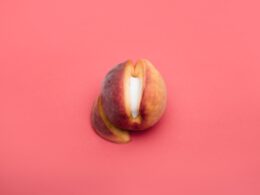We’ve all heard that your vulva smells and tastes different — it can be sweet, sour, salty or metallic. But it doesn’t necessarily have to be that way, especially if you’re taking good care of your bits.
It’s been anecdotally rumored that certain foods change your vulva’s taste and smell, like garlic, asparagus, or pineapple. But does that really work?
The vagina is naturally acidic.
A healthy vagina typically has a pH level between 3.8 and 4.5, which means it’s acidic. This pH balance is important to the health of your vulva because it helps prevent bacteria from growing there, which can cause infections. Harmful bacteria are constantly introduced into the vulva through things like sex, using the bathroom, and menstruation, so it’s crucial to keep that area as healthy as possible to fight infection.
Because the vagina is acidic, it may sometimes have a slightly salty or tangy taste to it. This is due to the fact that the vulva contains lactobacilli, which secrete lactic acid and hydrogen peroxide in order to keep the environment clean. You may also notice that your vulva has a slight taste of salt when you sweat, especially after working out or being in hot weather. This is because sweat contains a small amount of salt, and your body naturally tries to get rid of it through the vagina.
Some women also notice that their vulva tastes metallic or copper penny-like right before or during menstruation. This is because the blood from your menstrual cycle can elevate your vulva’s pH to a level that causes it to have a metallic flavor.
Sweat can leave your vaginal area with a hint of salt.
While there is no correct or ideal vaginal taste, a healthy vagina generally has a mild, clean and somewhat salty flavor. This is due to sweat, as well as the presence of good bacteria. In addition, the pH level of your vulva can change the taste and smell.
For example, if you sweat heavily, your vulva may have a salty, slightly metallic taste, which is normal. Similarly, some women experience a tangy or vinegary smell in their vulva, which is also normal and reflective of the healthy bacterial flora.
You can also change the way your vulva tastes and smells by changing the soap you use and how often you wash. Certain foods can also affect the taste and smell of your vulva, including asparagus (which causes strong-smelling urine), spicy food, and alcohol.
If your vulva suddenly begins to taste and smell like a flower stand or the Seattle fish market, it’s likely an indicator of an infection or other problem. Bacterial vaginosis, trichomoniasis and other infections can cause foul or offensive odors, along with yellowish discharge and a fishy taste. Treating the infection should help clear up the unpleasant odor and taste. Infections can also affect the vulva’s pH, which can cause it to taste sour or even like matzah. The area between your anus and your vulva can be particularly affected by these changes, as wiping incorrectly can allow bacteria to enter the vulva.
Hormones can change the taste of your vagina.
You probably don’t think about what your vulva tastes like, but it is normal for it to have a salty or metallic taste. This can be caused by sweat, or it could be something that you eat. If the change is sudden, it may be a sign of a problem, like an infection.
Your hormones can affect the taste and odor of your vagina. This is because they can alter the pH of your body fluids. It is more common for the vagina to have a metallic or copper penny-like taste right before or during menstruation, as blood can elevate the acidity of your vulva’s pH. It is also common for the vulva to have a fishy or foul smell, especially after intercourse. This can be a sign of an infection, like bacterial vaginosis.
If you have a sex partner that complains of a strange tasting vagina, it might be time to call the doctor. This isn’t necessarily a bad thing, however, as the vagina is designed to be self-cleaning and is capable of doing so if there are no external factors interfering with its natural pH.
You can keep your vulva clean by wearing loose and comfortable clothing, and washing often with mild soaps. You can also avoid scented products that can irritate the vulva, and eat foods that are rich in probiotics to maintain healthy bacteria.
Foods can change the taste of your vagina.
As long as it’s healthy and infection-free, your vagina is supposed to taste faintly of salty or metallic. Similarly, it’s fine for your hoohah to have a mild scent that smells like a flower or a juicy peach. If you’re noticing a strong, fishy, or foul odor, that could be a sign of an infection like bacterial vaginosis.
It’s also important to wash your vulva regularly, especially after sweating or exercising. That way, you’ll avoid a buildup of white, gooey discharge that tastes salty and smells unpleasant. To clean, you can use a cloth or your fingers to spread apart the labia. Then, gently wash each one with warm water and a gentle soap.
If you want to make your crotch taste a little bit sweeter, try eating pineapple or drinking a lot of pineapple juice. It’s packed with vitamin C and other essential nutrients that can improve your gut health. And it’s also known to increase sexual arousal.









